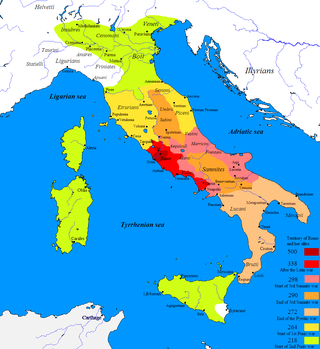
Publius Decius Mus (died 295 BC), of the plebeian gens Decia, was a Roman consul in the years 312 BC, 308 BC, 297 BC and 295 BC. He was a member of a family that was renowned for sacrificing themselves on the battlefield for Rome.

Publius Decius Mus (died 295 BC), of the plebeian gens Decia, was a Roman consul in the years 312 BC, 308 BC, 297 BC and 295 BC. He was a member of a family that was renowned for sacrificing themselves on the battlefield for Rome.
Publius Decius Mus, born the son of the consul of 340 BC Publius Decius Mus, was elected consul in 312 BC together with Marcus Valerius Corvus. When war broke out with the Samnites, Mus had to stay in Rome due to an illness and it was his colleague who was sent to manage the war. When the Etruscans joined in the war on the side of Rome's enemies, Mus was ordered by the Senate to appoint a dictator.
In 309 BC he served as a legate under the dictator Lucius Papirius Cursor and the next year he was elected consul again, this time with Quintus Fabius Maximus Rullianus as his colleague. While his colleague handled the war against Samnium, Mus was entrusted with the war against the Etruscans in which he was so successful that the Etruscans sued for a truce.
In 306 BC Mus was appointed as the Master of the Horse to the dictator Publius Cornelius Scipio Barbatus. In 304 BC, Mus and Rullianus were elected censor. In 300 BC Mus successfully espoused the cause of opening the pontificate to the plebeians against Appius Claudius Caecus.
In 297 BC Mus and Rullianus were again elected consul. This time both consuls were to go to Samnium to make war. In this campaign Mus was able to defeat a Samnite army near Maleventum. The next year saw his command in Samnium prorogued as proconsul.
The Third Samnite War saw Rome opposed by a formidable coalition of Etruscans, Samnites, Umbrians and Gauls. When Rullianus was unanimously called to the consulship, he stipulated as a condition for accepting that Mus again be his colleague so in 295 BC Mus was elected to a fourth consulship. While Mus was first stationed in Samnium, events up north dictated that both Roman armies be united to face the enemy. When the armies clashed near Sentinum, Publius Decius Mus commanded the left wing of the Roman army. Faced by the Gauls, his troops started giving way under their attacks and Mus followed the example of his father by performing the devotio , dedicating himself and the enemy army as sacrifices to the gods of the underworld, then rushing the enemy where he fell in the battle.
Publius Decius Mus was the father of the consul of 279 BC, Publius Decius Mus.
During the 290s BC, Hellenistic civilization begins its emergence throughout the successor states of the former Argead Macedonian Empire of Alexander the Great, resulting in the diffusion of Greek culture throughout the Levant and advances in science, mathematics, philosophy, etc. Meanwhile, the Roman Republic is embroiled in war against the Samnites, the Mauryan Empire continues to thrive in Ancient India, and the Kingdom of Qin in Ancient China, the one which in the future will conquer its adversaries and unite China, begins to emerge as a significant power during the Warring States period.
Year 297 BC was a year of the pre-Julian Roman calendar. At the time it was known as the Year of the Consulship of Rullianus and Mus. The denomination 297 BC for this year has been used since the early medieval period, when the Anno Domini calendar era became the prevalent method in Europe for naming years.
Year 296 BC was a year of the pre-Julian Roman calendar. At the time it was known as the Year of the Consulship of Violens and Caecus. The denomination 296 BC for this year has been used since the early medieval period, when the Anno Domini calendar era became the prevalent method in Europe for naming years.
Year 295 BC was a year of the pre-Julian Roman calendar. It was known in the Roman Republic as the Year of the Consulship of Rullianus and Mus. The denomination 295 BC for this year has been used since the early medieval period, when the Anno Domini calendar era became the prevalent method in Europe for naming years.

The First, Second, and Third Samnite Wars were fought between the Roman Republic and the Samnites, who lived on a stretch of the Apennine Mountains south of Rome and north of the Lucanian tribe.
Marcus Valerius Corvus, also sometimes known as Corvinus, was a military commander and politician who served in the early-to-middle period of the Roman Republic. During his career he was elected consul six times, beginning at the age of twenty-three. He was appointed dictator twice and led the armies of the Republic in the First Samnite War. He occupied the curule chair twenty-one times throughout his career. According to legend, he lived to the age of one hundred.

Lucius Cornelius Scipio Barbatus was one of the two elected Roman consuls in 298 BC. He led the Roman army to victory against the Etruscans near Volterra. A member of the noble Roman family of Scipiones, he was the father of Lucius Cornelius Scipio and Gnaeus Cornelius Scipio Asina and great-grandfather of Scipio Africanus.
Quintus Fabius Maximus Rullianus, son of Marcus Fabius Ambustus, of the patrician Fabii of ancient Rome, was five times consul and a hero of the Samnite Wars. He was brother to Marcus Fabius Ambustus.
The Battle of Sentinum was the decisive battle of the Third Samnite War, fought in 295 BC near Sentinum, in which the Romans overcame a formidable coalition of Samnites, Etruscans, and Umbrians and Senone Gauls. The Romans won a decisive victory that broke up the tribal coalition and paved the way for the Romans' complete victory over the Samnites. The Romans involved in the battle of Sentinum were commanded by consuls Publius Decius Mus and Quintus Fabius Maximus Rullianus.

Lucius Papirius Cursor was a celebrated politician and general of the early Roman Republic, who was five times consul, three times magister equitum, and twice dictator. He was the most important Roman commander during the Second Samnite War, during which he received three triumphs.
Quintus Fabius Q. f. M. n. Maximus Gurges, the son of Quintus Fabius Maximus Rullianus, was consul in 292, 276, and 265 BC. After a dissolute youth and a significant military defeat during his first consulate, he was given the opportunity to salvage his reputation through the influence of his father, and became a successful general, eventually holding the highest honours of the Roman state. He was slain in battle during his third and final consulate.

Publius Decius Mus, son of Quintus, of the plebeian gens Decia, was a Roman consul in 340 BC. He is noted particularly for sacrificing himself in battle through the ritual of devotio, as recorded by the Augustan historian Livy.

Titus Manlius Imperiosus Torquatus was a famous politician and general of the Roman Republic, of the old gens Manlia. He had an outstanding career, being consul three times, in 347, 344, and 340 BC, and dictator three times, in 353, 349, and 320 BC. He was one of the early heroes of the Republic, alongside Cincinnatus, Cornelius Cossus, Furius Camillus, and Valerius Corvus. As a young military tribune, he defeated a huge Gaul in one of the most famous duels of the Republic, which earned him the epithet Torquatus after the torc he took from the Gaul's body. He was also known for his moral virtues, and his severity became famous after he had his own son executed for disobeying orders in a battle. His life was seen as a model for his descendants, who tried to emulate his heroic deeds, even centuries after his death.
The Battle of Tifernum was an important battle of the Third Samnite War, fought in 297 BC near Castropignano, either on the banks of the river Biferno or near the Matese mountains in the province of Campobasso, in what is now southern Italy, where the Romans overcame a determined Samnite army. The result would lead to the decisive Battle of Sentinum, which granted Rome the domination of central Italy.
The gens Decia was a plebeian family of high antiquity, which became illustrious in Roman history by the example of its members sacrificing themselves for the preservation of their country. The first of the family known to history was Marcus Decius, chosen as a representative of the plebeians during the secession of 495 BC.

The Battle of Saticula, 343 BC, was the second of three battles described by the Roman historian Livy, in Book Seven of his history of Rome, Ab Urbe Condita, as taking place in the first year of the First Samnite War. According to Livy's extensive description, the Roman commander, the consul Aulus Cornelius Cossus was marching from Saticula when he was almost trapped by a Samnite army in a mountain pass. His army was only saved because one of his military tribunes, Publius Decius Mus, led a small group of men to seize a hilltop, distracting the Samnites and allowing the consul to escape. During the night Decius and his men were themselves able to escape. The next day the reunited Romans attacked the Samnites and completely routed them. Several other ancient authors also mention Decius' heroic acts. Modern historians are however sceptical of the historical accuracy of Livy's account, and have in particular noted the similarities with how a military tribune is said to have saved Roman army in 258 BC during the First Punic War.
Aulus Cornelius Cossus Arvina was a Roman statesman and general who served as both consul and Magister Equitum twice, and Dictator in 322 BC.
Gaius Sulpicius Longus was an accomplished general and statesman of the Roman Republic who served as Consul thrice and dictator once during his career, triumphing once over the Samnites and achieving great political success.
Publius Sempronius Sophus was a Roman politician and general who achieved the honors of being both consul and censor in his political career, as well as renown for being a talented and well respected jurist.